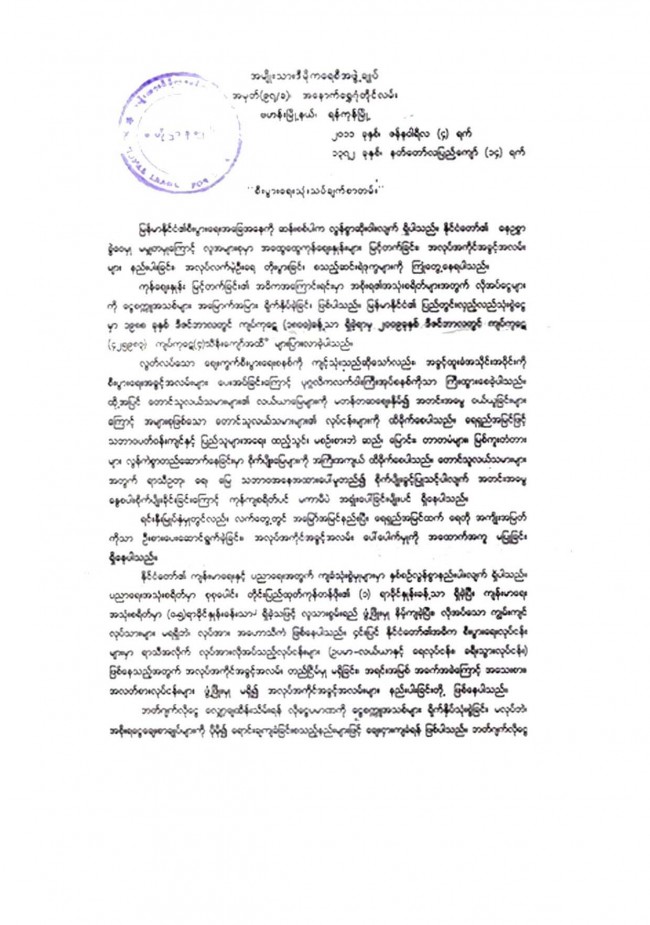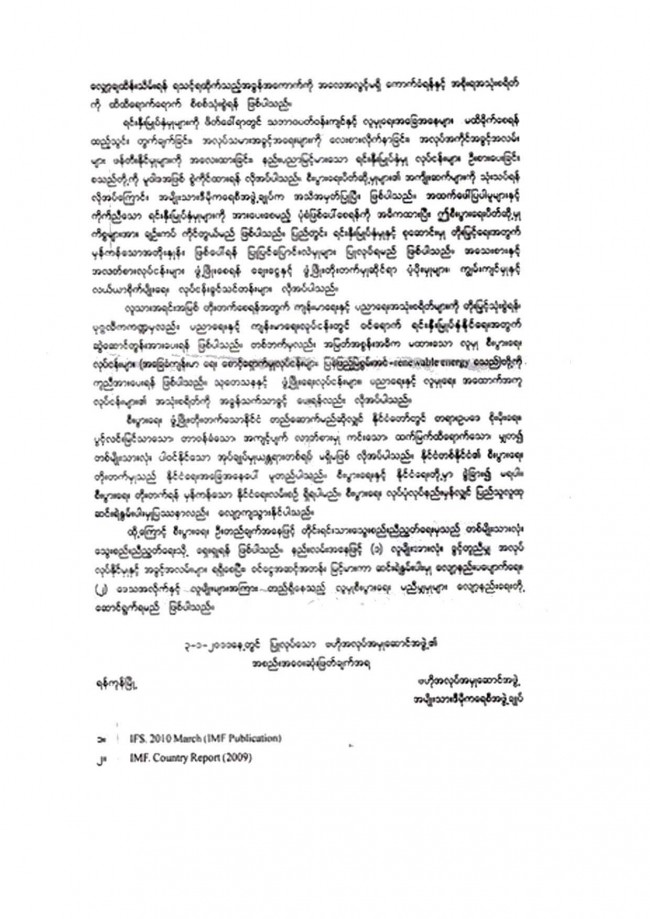Economic Analysis and Vision of the NLD
By National League for Democracy • January 4, 2011National League for Democracy
No. 97 (B) West Shwegondine Street
Bahan Township, Rangoon
January 4, 2011
Analysis of the Economy
An analysis of the economic situation in Burma shows clearly that the situation is dire. Due to the unequal distribution of state revenue, the majority of the people in Burma are facing high commodity prices, high unemployment rates and a lack of employment opportunities.
The main cause of the increased commodity prices is the government’s printing of large amounts of new money to cover the deficit in government expenses. In December 1988 the circulation of money in Burma was only 18 billion kyat but in December 2009, it increased to 4.25 trillion kyat.
Even though the government announced it now follows the principles of a market economy, the business elite has monopolized the economy due to special benefits and privileges granted. Furthermore, the economic situation of farmers has worsened because they have been forced to sell their farmland below value. There has been construction of dams, canals, bridges and other infrastructure, without any consideration for the environment or for local residents in the long run, destroying arable land. Forcing farmers to plant summer crops and denying them the choice of appropriate crops, according to weather, land, and environmental conditions, has caused them to lose crops and money.
Investments were made unwisely, providing only short-term rather than long-term benefits, and without creating new job opportunities.
The government spending on education and health is still very low. The spending on education is only about 1% of the GDP and the spending on health is only about 0.5%. This reduces human resource development and creates a shortage of skilled workers. Furthermore, some of the main economic sectors, such as agriculture, fishery and tourism, depend on seasonal workers. Thus, the unstable employment situation together with the lack of resources has led to the underdevelopment of small and medium businesses and a reduction of employment opportunities.
To control the budget deficit, the government should not have printed more currency but should have sold government bonds to cover the deficit. To control the budget deficit, the government is advised to collect taxes efficiently and reduce government expenses.
When inviting new investments, the government should do so according to policies that consider the social and environmental impact of the investments, as well as guaranteeing a respect for labor rights and civil and political rights. Furthermore, new investments should focus on the creation of employment opportunities and technological investments should be prioritized. The National League for Democracy agreed that the consequences of international economic sanctions must be reconsidered. The National League for Democracy will approach sanction related issues by focusing on the above-mentioned criteria for appropriate and wise investments. To increase local and international investments and savings, reforms to create stable profit rates must be made. For small and medium businesses to be prosperous, loans, developmental support, technical support and agricultural training must be provided.
For promoting human resources, spending on education and health must be increased, and investments from the private sector must be encouraged. On the other hand, social economic projects which do not solely focus on profits, such as basic health care, renewable energy and so on, must be encouraged. Tax exemptions for research and development, education and social welfare businesses are necessary.
To build an economically prosperous country and establish the rule of law, an inclusive, transparent and accountable administrative mechanism free from corruption is needed. A country’s economic development is linked to its political situation. Economy and politics cannot be separated; they are intertwined. For the economy to develop the right political trends are required. If the economy is on the right path, the economic hardship of the people can be reduced.
For the economic development of the country, ethnic and national unity is essential. To reach this goal:
- All nationalities must be provided with equal employment opportunities, must have higher incomes and the economic hardships they face must be reduced.
- The social and economic disparities between ethnic groups and regions must be eliminated.
By the decision of the Central Executive Committee meeting, held on the 3rd of January 2011.
Central Executive Committee
National League for Democracy
Rangoon
Ref:
- IFS 2010 March (IMF Publication)
- IMF Country Report (2009)
Download the statement in Burmese here.
Tags: Burmese, Economy, National League for Democracy, SPDCThis post is in: Press Release
Related PostsNew Report Exposes the Continued Ineffectiveness of the Myanmar National Human Rights Commission
ဝ ျပည္ေသြးစည္းညီညႊတ္ေရးပါတီ ႏွင့္ ကရင္အမ်ဳိးသားအစည္းအရံုး ပူးတြဲေၾကညာခ်က္
ASEAN Peoples’ Forum 2014 Representatives Meet with ASEAN Affairs Department of Ministry of Foreign Affairs of Myanmar to Prepare for an Interface Meeting with ASEAN Leaders
ထားဝယ္ေတာင္သူလယ္သမားမ်ား ဆႏၵထုတ္ေဖာ္ျခင္းအေပၚ သေဘာထားထုတ္ျပန္ခ်က္
Statement on Child Soldier











 All posts
All posts